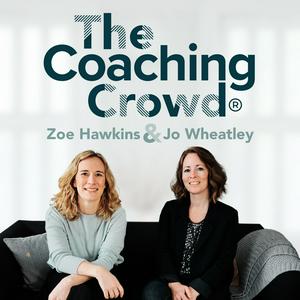What happens when a client walks into a session with an issue you did not prepare for, and you have to trust your presence rather than your plan?
In this episode of the Podcast, we to explore one of the most real and sometimes unsettling parts of being a coach: not knowing what a client is going to bring, yet being fully responsible for creating a space that can hold it.
We reflected on how often coaches ask questions like, how do I coach confidence, fear, conflict, burnout, overwhelm, or decision making. Beneath those questions is usually something deeper. A desire to feel competent. A wish to feel resourced. A fear of being caught out when a client arrives with something emotionally charged, complex, or unfamiliar.
What struck us during the conversation is how much of coaching is about unlearning the need for control. In most areas of life, we walk into conversations with a sense of the agenda. Coaching is different. The agenda emerges. The topic may be named, but the real work often sits underneath in emotion, belief, identity, or uncertainty.
We talked about how coach training gives us core skills that apply to any topic, yet many coaches still crave practical anchors. Questions, frames, observations, and ways of working that help them feel steady when a client says, I feel overwhelmed, I am stuck in fear, I cannot decide, or I have lost confidence. That is where topic based learning and community become powerful, not as scripts to follow, but as ways to deepen awareness and broaden choice.
We shared how, as coaches, we can sometimes narrow in too quickly on the words a client uses, or unconsciously overlay our own relationship with that topic. When a client brings fear, uncertainty, or burnout, it can trigger our own stories and associations. Building familiarity with common coaching themes helps us stay grounded, curious, and spacious rather than reactive or overly cognitive.
We also explored the fine balance between holding space and offering structure. There are moments when a client genuinely wants to hear what might be possible. A menu of approaches. A sense of what others have found useful. Knowing when to lean in with suggestions and when to stay with emergence is part of the art of coaching, and it develops with experience, supervision, and reflective practice.
One of the deepest reflections for us is that clients rarely bring what they actually need to work on. They bring what they can currently see. The coaching happens in the gap between the stated goal and the hidden pattern, emotion, or belief that is getting in the way. When we deepen our understanding of themes like uncertainty, self trust, overwhelm, decision making, and emotional regulation, we become better at noticing what is present but unspoken.
This episode is also an invitation to coaches who want to accelerate their confidence and capability. Through our how to series and accredited CPD, we are creating spaces to explore topics such as beliefs, burnout, confidence, conflict, fear, overwhelm, procrastination, certainty, metaphors, and constellations. Not to provide formulas, but to build presence, perception, and practical range so that whatever walks into the room, you can meet it with calm, clarity, and skill.
Coaching is not about mastering topics. It is about mastering yourself in the presence of whatever topic arrives.
Timestamps:
00:00 Welcome and why coaches ask how do I coach specific topics
02:20 The unpredictability of coaching and letting go of control
04:30 Building confidence through topic familiarity and CPD
06:40 Balancing suggestion with client led focus
08:10 Fear, uncertainty, and staying resourced as a coach
10:05 Deep dive into coaching uncertainty and emotional states
12:00 Clients bring goals, but the work is often underneath
14:00 The art of observation and naming what is emerging
15:00 CPD programme and community invitation
Key Lessons Learned:
Coaching competence grows when we trust the core skills rather than seeking topic specific formulas
Clients rarely name the real issue at the start of a session
Emotional states such as fear, overwhelm, and uncertainty often drive the presenting topic
Supervision, community, and shared learning accelerate a coach's confidence and pattern recognition
The balance between presence and practical structure is a developmental edge for every coach
Observations offered with care can reveal what clients cannot yet see for themselves
Keywords:
How to coach confidence, coaching uncertainty, emotional coaching, coaching overwhelm, coaching fear, coaching decision making, coach development, coaching presence, coaching supervision, coaching CPD, leadership coaching, self trust in coaching
Links and Resources:
https://www.igcompany.com/howto


